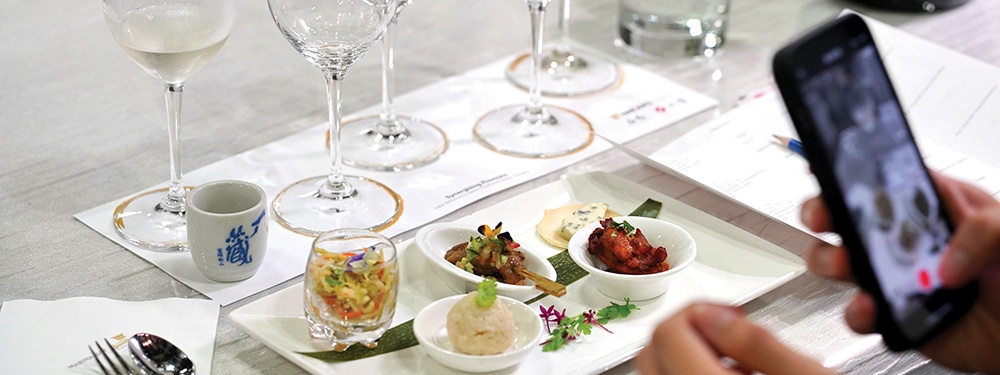Tastes of Vietnam from national brand to the ‘world’s kitchen’
The Hue Festival 2024 from June 7-12, the latest iteration of an event that has run for 24 years, will open up opportunities to introduce the cultural colours, art, and essence of traditional Vietnamese cuisine to international friends.
 |
| Tastes of Vietnam from national brand to the ‘world’s kitchen’ |
Nguyen Thanh Binh, vice chairman of Thua Thien-Hue People’s Committee, believes that festivals are a great and effective way to stimulate tourism.
“Hue’s tourism has regained its pre-pandemic form, welcoming about two million international visitors and two million domestic visitors by the end of April. Many traditional cultural elements of Hue and Vietnam have been integrated in festival programmes, especially our unique culinary culture,” he said.
The culinary scene is one of the competitive advantages of the ancient capital of Hue. According to the Vietnam National Authority of Tourism (VNAT), while Vietnam boasts about 1,700 unique dishes, Hue created around 1,300 of them.
“Hue possesses a large culinary foundation and treasure with a number of traditional dishes that leave many cultural and artistic values,” said Hue Phan Ton Tinh Hai, a culinary artist.
Hue is implementing long-term measures to preserve, build and promote culinary values, turning cultural brands into tourism brands with a strong position and appeal to tourists.
Duong Quoc Nam, president of the Vietnam Young Chefs Association, said, “Hue Festival is one of the programmes that spreads culinary culture to domestic and international tourists, conveying the message that Hue is worthy of being a city creating cuisine to the world, and at the same time creating the brand of Hue as a culinary capital.”
Besides Hue’s cuisine, Vietnam has long been known as a culinary destination with many dishes, typical of many regions and ethnic groups.
According to the World Tourism Organization (WTO), Vietnam is one of the 20 countries with the greatest potential for tourism, especially its street food. The World Culinary Awards under the World Travel Awards honoured Vietnam as “Asia’s Best Culinary Destination 2022,” surpassing China, Malaysia, Singapore, South Korea, and Thailand.
Local dishes such as banh my, pho, and banh xeo continue to appear in lists of the best street foods in Asia, and many world-famous magazines and culinary travel sites have praised Vietnam as a culinary destination.
Last year, the American travel website Travel and Leisure honoured Vietnam in its “Bucket List Places in Asia.” This site also recommends the best places for tourists to explore cuisine in Vietnam, highlighting Hanoi, Danang, and Ho Chi Minh City. Vietnam also ranked fifth in the list of 10 countries with the world’s most attractive cuisine, according to Canadian travel website The Travel.
In June 2023, the Michelin Guide awarded stars to four Vietnamese restaurants, three in Hanoi and one in Ho Chi Minh City.
Data from the WTO shows that tourists spend about 25-30 per cent of their budgets on food and beverages.
Nguyen Le Phuc, deputy director of the VNAT, said that cuisine was one of the main sources of revenue for tourism activities. The nation’s development strategy towards 2030 has identified culinary tourism as one way of contributing to enhancing the competitive advantage of Vietnamese tourism.
“Developing culinary tourism associated with destination experiences and community cultural identity is the goal of the Tourism Department. The industry will also strengthen the promotion of culinary culture through international events in key markets,” Phuc said.
To help develop Vietnamese culinary culture into a national brand, the Vietnam Culinary Culture Association (VCCA) conducted surveys over 2022-2024 and collected data to build a list of 1,000 of the best Vietnamese dishes.
According to Nguyen Quoc Ky, chairman of the VCCA, food is the fastest and simplest way to help tourists understand more about Vietnam, helping to build the country’s image and soft power across the world.
“When culinary culture becomes a national brand, it will be the most effective promotion and communication channel to promote tourism and be a premise for economic development,” Ky said.
The association project will aim to convert the database into a map of Vietnamese cuisine and build a 3D virtual reality-oriented culinary museum, creating a premise for Vietnam to become “the world’s kitchen”, Ky added.
 |
| Cultural diplomacy spreads traditional values
Nguyen Minh Hang - Deputy Minister of Foreign Affairs Along with economic diplomacy, cultural diplomacy continues to be a pillar and top priority of the Ministry of Foreign Affairs (MoFA). Vietnam’s cultural diplomacy strategy towards 2030 defines the motto of focusing on localities, people, and businesses. These three subjects are both beneficiaries and partners participating in and implementing the cultural diplomacy strategy. The MoFA has recently coordinated with the Ministry of Culture, Sports, and Tourism, and localities to build cultural diplomacy programmes including events and festivals, and participate in regional and international cultural exhibitions, to contribute to building the brand and promoting the culture of each locality. Many major cultural events, such as Hue Festival, Dalat Flower Festival, and Danang fireworks festival, have had the participation of the ministry. The MoFA also coordinates with localities to drastically and effectively deploy UNESCO to recognise cultural heritage titles. To date, Vietnam has 68 heritage sites recognised by UNESCO, exceeding the target of 60 heritage sites previously set. In the past two years, the MoFA has advised 23 localities to complete dossiers for submission to UNESCO. There are 63 localities that currently own at least one heritage title. We also play the role of connecting localities with international organisations to preserve recognised cultural values and titles, promoting the sustainable development of each locality. On May 8, UNESCO awarded a certificate honouring the Nine Peaks - Hue Imperial Palace into the list of World Documentary Heritage. This recognition is proof that Hue is recognised as a heritage city, continuing to create motivation to promote tourism potential and contribute to the sustainable development of Thua Thien-Hue. Cuisine simulates the cultural life of Vietnamese people
Vu Thi Thu Huyen - Founder and CEO, Dana Vegan House Working in the service and tourism industry for more than 10 years, I am always proud of my international friends because Vietnam is blessed with a rich source of raw materials and herbs, which are the ingredients to create an attractive culinary life. When choosing rice grains as the main theme of the concept, I hope that every diner coming to Dana Vegan House will understand more about Vietnam’s wet-rice culture in the past through recreating images of dry rice plants and an ancient three-room house in the northern region, agricultural tools used by farmers. I always believe that every dish has its own story, every restaurant is a place that simulates the cultural life and cuisine of Vietnamese people. Coming to Dana, many foreign diners will be curious about vegetarian pho, vegetarian vermicelli, vegetarian spring rolls, or simple home-cooked rice dishes imbued with Vietnamese culture and rich in nutrition. In addition, some customers are also curious about curries and pizzas made with local ingredients. Choosing a location in the middle of the old town and a restaurant designed according to a traditional concept is an addition that helps us attract the attention of many tourists in the old town. However, increasing promotion on international channels is also one of our top concerns in spreading the image. I look forward to having the opportunity to serve diners around the world and introduce Vietnamese culinary culture and life. Conquering Michelin stars is also the goal we set to quickly receive the support of domestic and international diners. |
What the stars mean:
★ Poor ★ ★ Promising ★★★ Good ★★★★ Very good ★★★★★ Exceptional
Related Contents
Latest News
More News
- Dong Ho folk painting added to UNESCO’s urgent safeguarding list (December 11, 2025 | 18:09)
- Conference focuses on switch from dog and cat meat trade to sustainable, safe jobs (December 11, 2025 | 12:13)
- 3F Plus clean pork amazes Michelin-starred chefs (December 09, 2025 | 12:15)
- The Rhythm of Blues – Colours of the Year 2026 (December 06, 2025 | 12:10)
- Pan Pacific Hanoi kicks off 2026 art awards celebrating young and disabled artists (November 06, 2025 | 18:25)
- PREP AI Language Fair 2025 highlights AI-powered language learning (November 03, 2025 | 09:00)
- Hanoi strengthens rabies control and supports transition of dog and cat meat trade (October 28, 2025 | 18:09)
- World-famous Gaia Earth installation touches down at UNIS Hanoi (October 07, 2025 | 13:40)
- Sidecar passion drives Vietnamese motor enthusiasts wild (September 05, 2025 | 09:00)
- Sheraton Saigon unveils artistic mooncake collection for 2025 (August 08, 2025 | 09:00)



 Tag:
Tag:


















 Mobile Version
Mobile Version